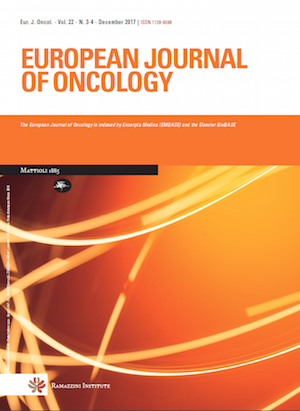Pathophysiological roles, molecular interactions and clinical implications of long non-coding RNA CCAT2 in human cancer
Abstract
Less than 2% of human genome has protein-coding ability, while over 90% is transcribed into non-coding RNA (ncRNA). NcRNA can be divided into small ncRNAs (<200 nucleotides) and long ncRNAs (>200 nucleotides). Small ncRNAs, including microRNAs (miRNAs), small interfering RNAs (siRNAs), and others have been investigated in recent years and recognized as key players in regulating cellular processes and diseases, including cancer. Long non-coding RNAs (lncRNAs) attracted increasing attention in recent years as researchers have revealed their crucial roles as regulators in embryogenesis, stem cell biology, and development. Furthermore, growing evidence indicates that dysregulation of lncRNAs is involved in cancer, and the regulatory functions and mechanisms of lncRNAs in human carcinomas have begun to emerge. Colon cancer-associated transcript 2 (CCAT2) is a lncRNA transcribed from human 8q24 gene desert, which has been recently found to be deregulated in several tumor types. In this review, we will briefly analyse the roles and mechanisms of lncRNAs CCAT2 involvement in human cancer, and we will discuss the future perspectives for research and clinical applications.
Downloads
Published
Issue
Section
License
OPEN ACCESS
All the articles of the European Journal of Oncology and Environmental Health are published with open access under the CC-BY Creative Commons attribution license (the current version is CC-BY, version 4.0 http://creativecommons.org/licenses/by/4.0/). This means that the author(s) retain copyright, but the content is free to download, distribute and adapt for commercial or non-commercial purposes, given appropriate attribution to the original article.
The articles in the previous edition of the Journal (European Journal of Oncology) are made available online with open access under the CC-BY Creative Commons attribution license (the current version is CC-BY, version 4.0 http://creativecommons.org/licenses/by/4.0/).
Upon submission, author(s) grant the Journal the license to publish their original unpublished work within one year, and the non exclusive right to display, store, copy and reuse the content. The CC-BY Creative Commons attribution license enables anyone to use the publication freely, given appropriate attribution to the author(s) and citing the Journal as the original publisher. The CC-BY Creative Commons attribution license does not apply to third-party materials that display a copyright notice to prohibit copying. Unless the third-party content is also subject to a CC-BY Creative Commons attribution license, or an equally permissive license, the author(s) must comply with any third-party copyright notices.

